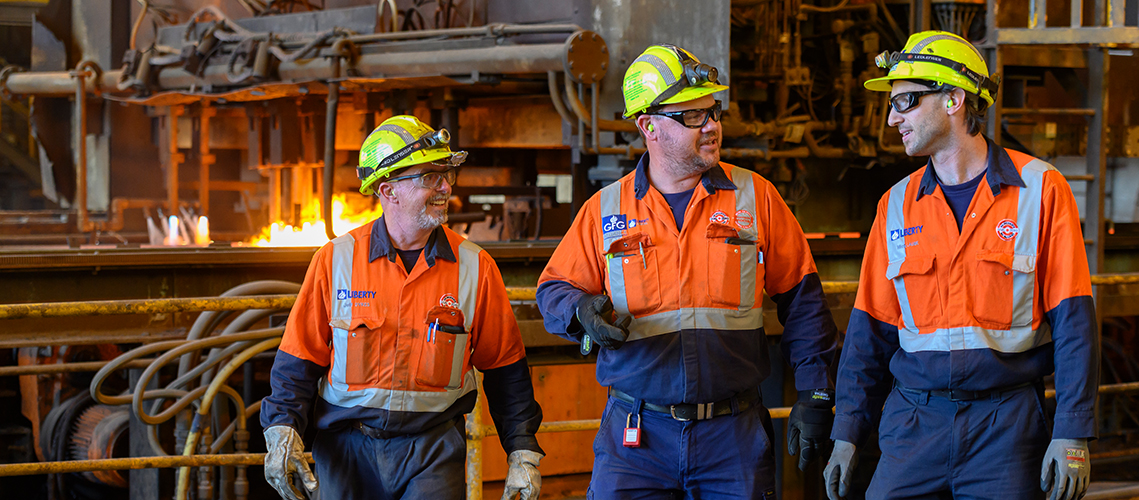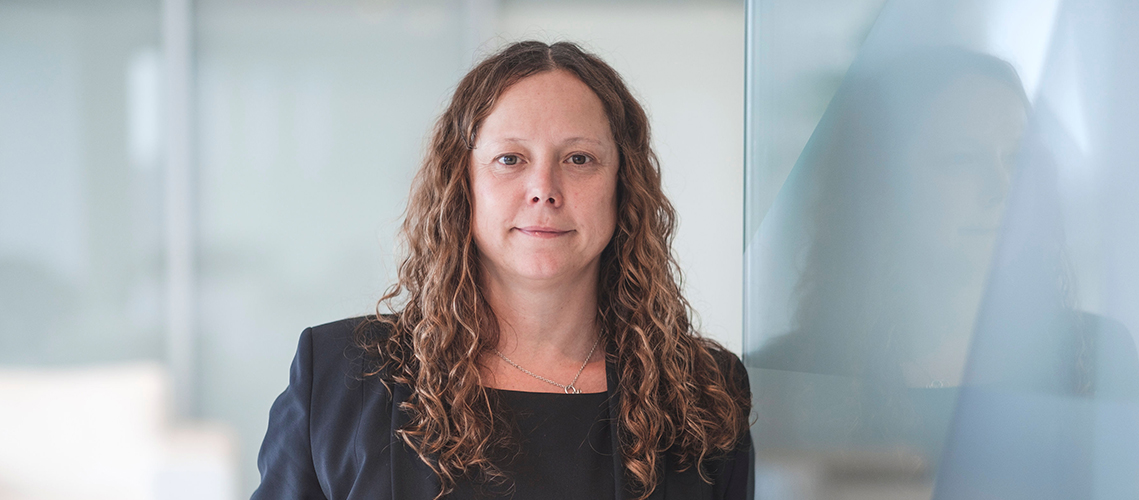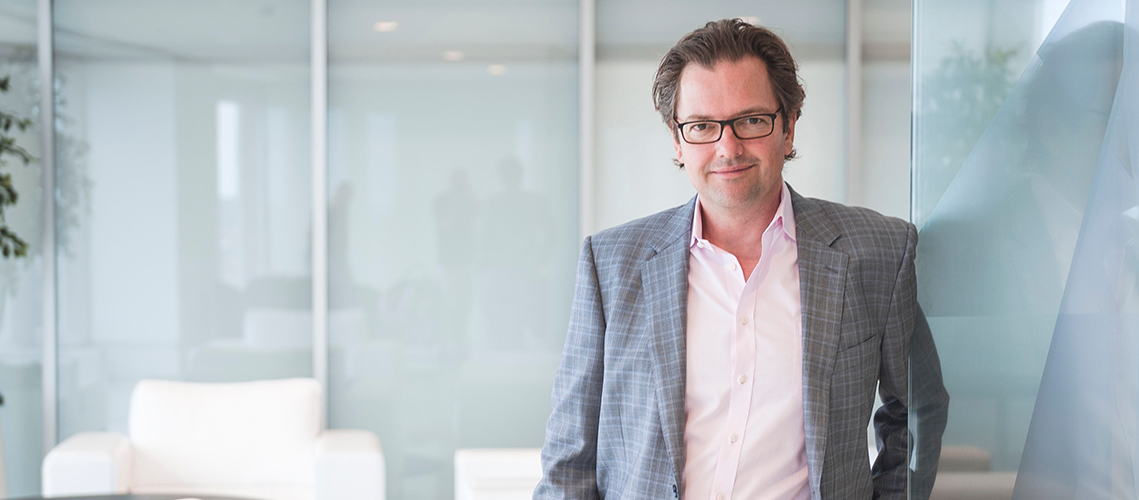Whyalla featured on hit documentary series Australian Story
In September 2018, the ABC’s hit documentary series Australian Story tracked ...

Pictured: Steelworkers on the job
The job of warehouse supervisor doesn’t normally involve redesigning site equipment so that it functions more efficiently. But that didn’t stop Jeff Devine and the team at InfraBuild’s Darwin operation in Australia.
After noticing the arms of the warehouse’s cantilevered ‘tree racks’ storage system had to be removed and stored when not in use, Jeff wondered if there was a better way of doing things. He found that by welding an extra length of steel to the picking arm, it could be turned sideways and folded out of the way.
This solution, invented and created by the people who work in the warehouse, proved to be a great way of increasing workplace safety for pickers and operators, of saving time, and of freeing up storage space. The team in Darwin is now installing the new arms on every rack in the warehouse.
The fact that Jeff was able to put his great idea into practice, with the support of the Darwin team, is an example of how culture change can often occur at the grass-roots levels, and how it involves real action. Innovation can come from anywhere, if people believe that it is in their power to change things.
An essential part of GFG Alliance
Our Executive Chairman, Sanjeev Gupta, says ‘change’ is an essential part of the organisation and is one of the three company guiding values, alongside ‘family’ and ‘sustainability’. “Accepting change as a value for us is very profound because, then, you will never fail to evolve and never fail to grow,” he says. “We are known for buying businesses that are going through a relatively tough time and turning them around. And that requires change.”
In order for the Alliance to harness the benefits of change, individuals must take ownership of it. They need to be the change, he says. In turn, people need the freedom to try new things, “to make mistakes, to fail, to not be scared to do any of that, to have the comfort of a family that you are allowed to try things and fail”.

Global Head of Human Resources Denise Timns
Our Global Head of HR Denise Timns says the success of the business depends on the development of an empowering organisational culture.
We need to be disruptive in every market we go in to. We need to do it differently; we need to do it better. Every day, there is a new piece of technology or a new player in the market. Really, with this company, it is about setting your own future and you contributing to that, rather than waiting to be told what to do.
Aaron McEwan, Vice President of Advisory at research firm Gartner and a global subject matter expert on culture, has been working with the GFG Alliance team and says even the best strategies are likely to fail if they are not backed by a supportive organisational culture.
He makes the point there is no “perfect” organisational culture. “But there is a very clear equation to getting it right,” he says.
Well placed to succeed
Failures of culture are evidence that changing a culture is not easy. However, Aaron says that organisations such as GFG Alliance are better placed than most to succeed in the task because of the change that has already taken place in heavy industry and mining. “If you go back 20 years, these workplaces were unsafe,” he says. “So, we went on a journey to make those workplaces safe and show every employee what a safe workplace looks like.”
Aaron says GFG Alliance is trail blazing in embracing ideas from its businesses. “It is empowering its workforce to innovate, take ownership for their work, and contribute freely,” he says. “Most organisations, particularly in mining and energy, still take a top-down approach to leadership and change, where centralised decision making and inefficient command-and-control approaches stifle the creativity and productivity of their employees.” GFG Alliance is also leading in its efforts to drive agility and collaboration through individual accountability.
“Whereas the average organisation makes collaboration a corporate value and rewards collaborative behaviour at year end, GFG is encouraging employees to do the work of figuring out how they’ll collaborate upfront, during the goal-setting process,” Aaron says.
This collaboration takes place in three stages. First, employees develop goals with their teams, enabling the team to challenge them on whether they are working on the right things to move the business plan. Next, employees map out who they have to work with across the organisation to achieve their goals. Finally, after mapping those relationships, they rate the quality of the relationship and the potential impacts on the goals if each person doesn’t deliver what is needed. This helps them prioritise which relationships they need to focus on.

Global Lead for Culture and Performance Grant Schmidt
GFG Alliance Global Lead for Culture & Performance Grant Schmidt explains that a culture is the sum total of its parts and cannot be imposed by leaders. “GFG’s culture is the result of each employee interacting and cannot be thought of as a single aspirational state,” he says.
GFG Alliance is piloting an employee survey tool called ‘Your Voice’ which will regularly survey employees, making it easier for individuals to have their voices heard and enabling better, more transparent conversations with team leaders.
Encouraging survey results
In Australia, more than 60 per cent of the organisation took part in the pilot, contributing some 35,000 comments. Based on these contributions, the overall engagement score came in at 6.9 out of 10 and highlighted key areas for improvement, such as more regular recognition of accomplishment and re-investing in supporting learning. Highlighted strengths included a strong sense of organisational fit with the GFG Alliance vision.
The plan is to make this tool available to all GFG Alliance operations globally and increase its use as the business builds an understanding on the value it can offer. “We’re trying to understand the perspectives of each of our people,” says Grant. “We also want to access their experience and knowledge to help shape a better outcome for our businesses, but this also requires effort from every employee.”
At the end of 2018, Grant sponsored a Change Lab – a two-day “experiment” involving a small but representative population of employees from Whyalla. Participants came from all areas of the Liberty Primary Steel business and its surrounding ecosystem, including contractors and SIMEC Mining.
The participants were asked to consider how they could together create a more sustainable future for Liberty Primary Steel. “It is a very confronting question because most people only want to experience a positive change – but that is unrealistic,” says Grant.
Change will only occur when you have a lot of people doing something different to what they did yesterday. We are developing and will introduce ways to encourage individual-level change to happen at scale and in a broadly connected way to deliver real impact; but it will take time and investment.
Grant says that the Liberty Primary Steel people had been through a torrid time in the recent past, subjected to changes that had been “authored” by others rather than themselves. “Sanjeev’s vision is that you are the author of your own destiny. You are an owner of your business,” he says. “That couldn’t have been more different from the mindset and the reality prior to the acquisition by GFG.”
Our guiding values drive our culture
Leave A Reply